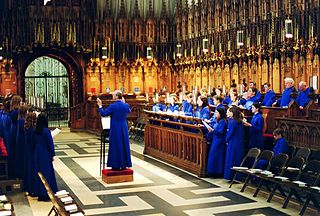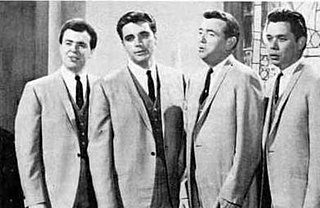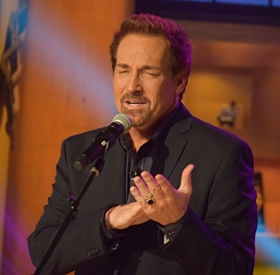
Music performed a cappella, less commonly spelled a capella in English, is music performed by a singer or a singing group without instrumental accompaniment. The term a cappella was originally intended to differentiate between Renaissance polyphony and Baroque concertato musical styles. In the 19th century, a renewed interest in Renaissance polyphony, coupled with an ignorance of the fact that vocal parts were often doubled by instrumentalists, led to the term coming to mean unaccompanied vocal music. The term is also used, rarely, as a synonym for alla breve.

A choir is a musical ensemble of singers. Choral music, in turn, is the music written specifically for such an ensemble to perform or in other words is the music performed by the ensemble. Choirs may perform music from the classical music repertoire, which spans from the medieval era to the present, or popular music repertoire. Most choirs are led by a conductor, who leads the performances with arm, hand, and facial gestures.

A barbershop quartet is a group of four singers who sing music in the barbershop style, characterized by four-part harmony without instrumental accompaniment, or a cappella. The four voices are: the lead, the vocal part which typically carries the melody; a bass, the part which provides the bass line to the melody; a tenor, the part which harmonizes above the lead; and a baritone, the part that frequently completes the chord. The baritone normally sings just below the lead singer, sometimes just above as the harmony requires. Barbershop music is typified by close harmony— the upper three voices generally remain within one octave of each other.
The Soul Stirrers were an American gospel music group, whose career spans over eighty years. The group was a pioneer in the development of the quartet style of gospel, and a major influence on Soul, Doo wop, and the Motown sound, some of the secular music that owed much to gospel.
Gospel music is a traditional genre of Christian music, and a cornerstone of Christian media. The creation, performance, significance, and even the definition of gospel music varies according to culture and social context. Gospel music is composed and performed for many purposes, including aesthetic pleasure, religious or ceremonial purposes, and as an entertainment product for the marketplace. Gospel music is characterized by dominant vocals and strong use of harmony with Christian lyrics. Gospel music can be traced to the early 17th century.
A chord is in close harmony if its notes are arranged within a narrow range, usually with no more than an octave between the top and bottom notes. In contrast, a chord is in open harmony if there is more than an octave between the top and bottom notes. The more general term spacing describes how far apart the notes in a chord are voiced. A triad in close harmony has compact spacing, while one in open harmony has wider spacing.

Barbershop vocal harmony, as codified during the barbershop revival era (1930s–present), is a style of a cappella close harmony, or unaccompanied vocal music, characterized by consonant four-part chords for every melody note in a primarily homorhythmic texture. Each of the four parts has its own role: generally, the lead sings the melody, the tenor harmonizes above the melody, the bass sings the lowest harmonizing notes, and the baritone completes the chord, usually below the lead. The melody is not usually sung by the tenor or baritone, except for an infrequent note or two to avoid awkward voice leading, in tags or codas, or when some appropriate embellishment can be created. One characteristic feature of barbershop harmony is the use of what is known as "snakes" and "swipes". This is when a chord is altered by a change in one or more non-melodic voices. Occasional passages may be sung by fewer than four voice parts.

Jake Hess was an American Grammy Award-winning southern gospel singer.
The Stamps-Baxter Music Company was an influential publishing company in the shape note Southern gospel music field. The company issued several paperback publications each year with cheap binding and printed on cheap paper. Thus, the older books are now in delicate condition. These songbooks were used in church singing events, called "conventions," as well as at other church events, although they did not take the place of regular hymnals. Among the country music and bluegrass "standards" that were first published by Stamps-Baxter are "Rank Strangers to Me", "Just a Little Talk with Jesus", "Precious Memories", "Farther Along", "If We Never Meet Again", "Victory in Jesus", and "I Won't Have to Cross Jordan Alone".
Southern gospel music is a genre of Christian music. Its name comes from its origins in the southeastern United States. Its lyrics are written to express either personal or a communal faith regarding biblical teachings and Christian life, as well as to give a Christian alternative to mainstream secular music. Sometimes known as "quartet music" for its traditional "four men and a piano" set up, southern gospel has evolved over the years into a popular form of music across the United States and overseas, especially among baby boomers and those living in the Southern United States. Like other forms of music, the creation, performance, significance, and even the definition of southern gospel varies according to the cultural and social context. It is composed and performed for many purposes, ranging from aesthetic pleasure, religious or ceremonial purposes, or as an entertainment product for the marketplace.
Gas House Gang was a barbershop quartet that won the 1993 SPEBSQSA International Quartet Competition. They started singing as a group in 1987 in St. Louis Missouri. After winning the 1988 Central States District Competition in their first attempt, they began a steady climb up the International Competition ladder which culminated in Calgary, Alberta, Canada, where they were awarded the 1993 International Quartet Championship.
The Soweto String Quartet is a string quartet from Soweto in South Africa composed of Reuben Khemese, Makhosini Mnguni, Sandile Khemese and Thami Khemese. Their music is a fusion of the "dance rhythms of Kwela, the syncopated guitars of Mbaqanga, the saxophones and trumpets of swaying African jazz and the voices of people singing in joyous, easy harmony". The Soweto String Quartet is autonomous and independent and has not affiliated with any organisation or institution since its inception. The quartet became a full-time professional outfit in 1992. They performed at President Mandela's inauguration, after which Mandela started recommending them for other jobs. The album Zebra Crossing peaked at number 16 and Renaissance peaked at number 29 on the Australian ARIA Charts.

The Imperials are an American Christian music group that has been active for over 55 years. Originating as a southern gospel quartet, the innovative group would become pioneers of contemporary Christian music in the 1960s. There have been many changes for the band in membership and musical styles over the years. They would go on to win four Grammys, 15 Dove Awards and be inducted into the Gospel Music Hall of Fame.

The Forester Sisters were an American country music vocal group consisting of sisters Christy, June, Kathy, and Kim Forester. Having performed together locally in their native Lookout Mountain, Georgia, since the 1970s, the four sisters began singing full-time in the 1980s and signed to Warner Records Nashville in 1984. Their greatest commercial success came between then and 1991, when they charted fifteen top-ten hits on the Billboard Hot Country Songs chart, five of which went to number one: "I Fell in Love Again Last Night", "Just in Case", "Mama's Never Seen Those Eyes", "Too Much Is Not Enough", and "You Again". They won the Academy of Country Music Group of the Year award in 1986 and were nominated three times for a Grammy Award. In addition to their country music albums, they released multiple albums of gospel music and one of Christmas music.
The Statesmen Quartet were an American southern gospel quartet founded in 1948 by Baptist Minister Hovie Lister. Along with the Blackwood Brothers, the Statesmen Quartet were considered the most successful and influential gospel quartet of the 1950s and 1960s and had a wide influence on artists during that time from the gospel, country, pop, and rock and roll genre. Along with hits spanning many decades, The Statesmen Quartet had many notable successes including being the first Gospel group to receive endorsement deals. Additionally, they made television commercials, appeared on numerous radio and TV shows, and were signed to RCA Victor before launching their own record label, Skylite Records, with The Blackwood Brothers.

Michael English is an American Christian singer and record producer. Initially, he was a member of his family's singing group, and later a member of The Gaither Vocal Band. During his solo career, he recorded eight studio albums. English's highest-charting solo single was "Your Love Amazes Me", which reached No. 10 on the Adult Contemporary chart in 1996.
Traditional black gospel is music that is written to express either personal or a communal belief regarding African American Christian life, as well as to give a Christian alternative to mainstream secular music. It is a form of Christian music and a subgenre of black gospel music.

Vocal harmony is a style of vocal music in which a consonant note or notes are simultaneously sung as a main melody in a predominantly homophonic texture. Vocal harmonies are used in many subgenres of European art music, including Classical choral music and opera and in the popular styles from many Western cultures ranging from folk songs and musical theater pieces to rock ballads. In the simplest style of vocal harmony, the main vocal melody is supported by a single backup vocal line, either at a pitch which is above or below the main vocal line, often in thirds or sixths which fit in with the chord progression used in the song. In more complex vocal harmony arrangements, different backup singers may sing two or even three other notes at the same time as each of the main melody notes, mostly with a consonant, pleasing-sounding thirds, sixths, and fifths.
Thomas Mosie Lister was an American singer and Baptist minister. He was best known for writing the Gospel songs "Where No One Stands Alone", "Till the Storm Passes By", "Then I Met the Master" and "How Long Has It Been?" As a singer, he was an original member in The Statesmen Quartet, the Sunny South Quartet, and the Melody Masters. In 1976 Lister was inducted into the Gospel Music Hall of Fame and the Southern Gospel Music Association in 1997. His songs have been recorded by nearly every Southern Gospel artist.
Lee Roy Abernathy (1913–1993) was a Southern gospel music musician, songwriter, and performer.









